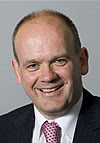
The last but one Mayor's Questions took place on Wednesday morning. With only one more to before the election, the content was strongly political and some of the exchanges were quite heated. Interestingly, there was a whole crop of motions discussed at the end of the meeting.
London Travelwatch
With ten years since the creation of Travelwatch - under its more cumbersome title, The London Transport Users' Committee - I moved a motion seeking to set up a cross party review of their performance. This received support from the whole chamber and was also welcomed by the chair of Travelwatch in a letter sent to all Assembly Members.
The review will be set up by our Business Management Committee and will examine the relationship between Travelwatch and the Assembly, particularly the respective roles of our Transport Committee and Travelwatch, which have tended to overlap in the past. The cost of running Travelwatch and the split between its statutory and discretionary activities will also be considered.
Meanwhile, Travelwatch are coming to Romford where they will be hosting a local transport surgery on Friday 5th March. More details are available from their website, http://www.londontravelwatch.com/ .
London City Airport
Labour Member Murad Qureshi, moved a motion which was critical of Newham's Council and the Mayor for their decision to allow the expansion of London City Airport, and requested a review of the decision at Mayoral level. I have suggested that Murad's Environment Committee conducts a scrutiny of London City Airport and this is going to take place in the coming year.
Speakers from all sides weighed in to support the motion and I made the point that complaints of overflying are increasing in my own constituency. Elm Park, South Hornchurch and Wanstead are particularly affected by aircraft noise and this is only going to get worse. I fear that, left unchecked, a Heathrow situation could develop in North East London and it will be very hard to reverse.
The motion was also approved with cross party support.
Peoples' Question Time
It hardly seems any time at all since we visited Brixton with Boris and had items thrown at the stage. Hopefully the next public meeting will be more even tempered. It takes place at Harrow School next Wednesday evening. Full details at http://www.london.gov.uk/ .









